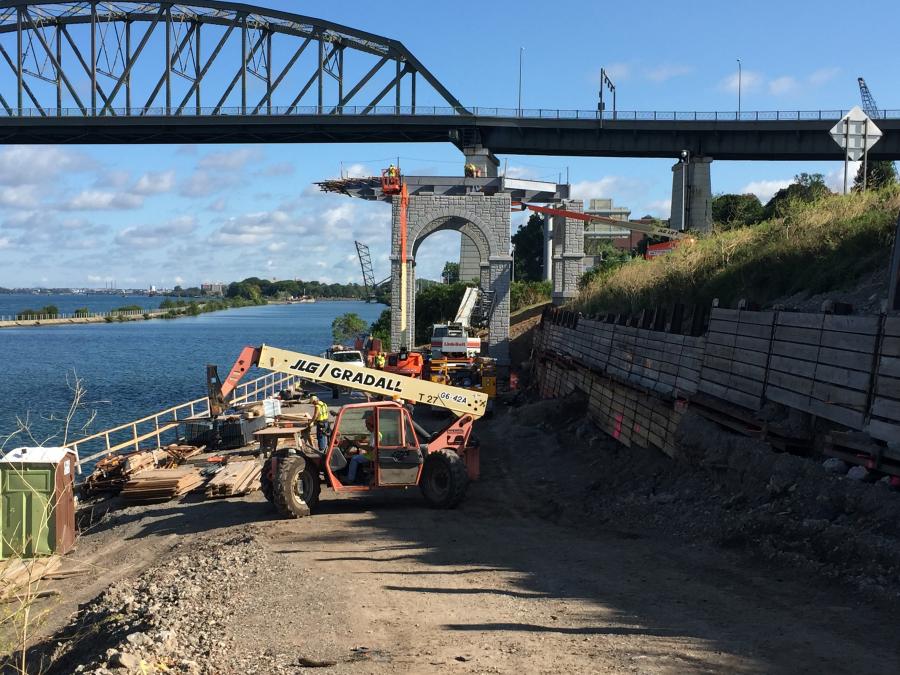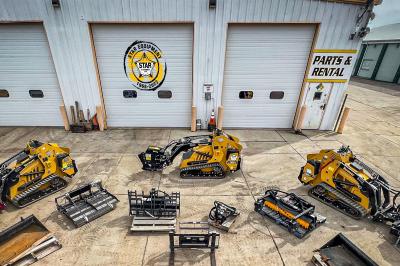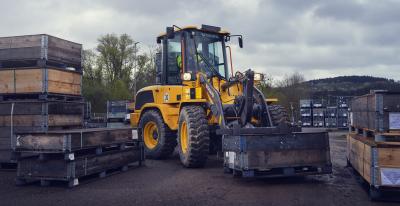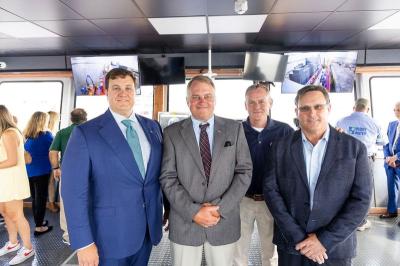Union crews construct a viewing platform on the Shoreline Trail.
The late George Hill founded Union Concrete and Construction Company in 1950, a family-owned business that is now run by his three children — Robert, Gary and Jodi Hill-Osinski. His granddaughter, Carley Hill, also works at the family business.
This heavy highway contracting firm, whose headquarters is in West Seneca, operates in the western New York area, and primarily performs road and bridge construction/rehabilitation for the New York State Department of Transportation (NYSDOT), New York State Thruway Authority (NYSTA) and various counties, towns, and cities in the area. The company also has completed projects for New York Power Authority (NYPA), NRG Energy and area airports.
“It's family-owned and all of the people who work for us are part of this family,” said Robert Hill, who noted that at its earliest stages of growth, the firm specialized in home construction and heavy commercial work. “My dad started Union and he began forming and pouring concrete foundations. In 1959 he wanted to get into general contractor work and he looked for a field that wouldn't interfere with any of the general contractors that he had worked for as a subcontractor. He believed in fair play, decency and respected the help he received from them. So, he went into highway work.”
Robert was born two months after his father formed the company, with three siblings to soon follow. He and Gary started working for Union Concrete as teenagers, working during the summer as laborers and later, operating engineers. Meanwhile, Jodi earned her engineering degree from the University at Buffalo. Robert and Gary took control of Union Concrete in 1980, as their father gradually handed over the reins. Jodi was brought in as a partner to help with the business end of the firm's affairs. This formula has proven successful and has allowed the company to grow, with public works accounting for most of its business.
“I was 27 before I even started working in the office,” said Robert. “It's very important to learn how to react to problems that come up on the job. You need to have field experience to be successful in this business. My brother and I are constantly visiting and working at the various job sites. We have estimators and procurement people, and we knew the company would be better served by applying our strengths out in the field.”
Historically, Robert has been responsible for the equipment purchases and maintenance issues, focusing on jobsite challenges such as demolition, implosion and the recycling and reuse of materials. Gary excels at seeing the big picture of complex, multifaceted projects. He also has maintained executive level involvement state wide, pushing for greater investment in the industry by political leaders. Both men play an active and essential role in the growth, development and retaining of the skilled workforce necessary to produce high quality, long lasting public works.
By 1970 the firm had made the transition to working almost exclusively on public works projects and the skills that both brothers had acquired were very much in demand. Union Concrete's work is seasonal. The majority of the construction occurs from mid-March to mid- and late December. The company employs nearly 160 people at various project sites throughout the season. Keeping the team together is a priority of the Hill family and has been key to their continued success.
“Our people know that they have a job with us,” said Gary. “We're not going through boom times right now, but we manage to keep everybody going. We tend to bid work for the people that are available to us as opposed to bidding wide work.”
The firm's volume of work is down 20 percent compared to three years ago, but its crews are engaged in many ongoing projects such as the Gateway Connections and the Youngman Expressway bridges. Some of its most important and memorable projects include Furhman Boulevard in Buffalo, the Thruway paving projects in Hamburg and Pembrook and most recently, the Buffalo International Airport runway project.
“We emphasize and focus on dispute resolution and pay attention to procurement details internally,” said Jodi. “Our core management teaches our young employees that there is no corner worth cutting. Iron out the details and things will fall into place.”
Most recently, the Gateway Connections project was awarded on a Best Value Bidding process, which took into account both experience and performance.
“It was a very extensive project to bid and it was based on the company's proven ability to accomplish it,” said Gary. “They have means and methods in the process to place value on your experience and credit to rate you and it doesn't necessarily have to be the low bid. It's the best value for their money. This project falls between design-build and low bid.”
Like many contractors with a long history, Union has second and third generation employees among its ranks. Carley Hill manages the health and safety program for the company and has developed several tools that take advantage of new technology, such as text reporting of equipment issues or failures and good old-fashioned employee recognition and reward for hazard prevention and watching each others' backs.
“We take good care of our people, treating them like family and we take good care of our customers and the traveling public,” she said. “Our goal, like that of my grandfather, is to do an excellent job and be safe doing it. When you build a road or bridge, you want to build it once. We don't wait on issues — if we see a fire, we put it out right away.”
Communication is important at Union Concrete when it comes to getting the right piece to the right job. The job site superintendants meet and communicate with each other, as well as with the shop foreman and the safety manager to ensure that equipment is ready when it is needed.
“Consistent communication is key for the mechanical staff to the folks in the field,” said Robert. “One of the greatest assets and strengths of Union Concrete is the genuine care and concern of each employee and confidence that their concerns will be listened to and addressed. If an employee has a truck on the road and notices that it's dogging to the left or the backup alarm isn't working on an excavator, they can tell their supervisor or the mechanics. They can also send a text to an equipment hotline that gets forwarded to the safety manager and the shop foreman. This helps to ensure that there are multiple levels of oversight, expanding safety and productivity for all.”
Tom Jacobs, the shop superintendent, has been with Union for 40 years.
“We address any immediate and emergency needs in the field as best we can,” he said. “If it's a major problem or repair, we can bring the equipment back to our shop. Most of our projects are within 100 miles of the shop.
“Robert Hill conveys his thoughts to us in the shop and we do our best to fulfill them,” he said, “but he also seeks our input as communication is very open in our company. It's important to hire the best people that you can find and we've been fortunate to be able to do that.”
“We work with the manufacturers to provide training for our mechanics and to provide the latest information on repairs and systems/parts,” said Robert Hill. “Cat and Komatsu have programs where you pay an annual fee and have access to all of their service systems, but we still hang a great value on our dealers to be there when we have a problem. The reason we have so many mechanics is because it is a necessity for keeping things running smoothly in the field.
“Highway work has taken us into a lot of night work and when you have pavers and mills you need people who know those machines and it's most important to us to have a mechanic that can deal with any problem, at any time. I like to be able to fix my own equipment and our mechanics are busy with routine maintenance and daily wear and tear issues.”
The heavy iron maintenance shop can handle six dozers or excavators simultaneously or two or three heavy trucks and the mechanics are at home in the field.
“It's part of their lives,” said Robert Hill. “During the hardest winters in Buffalo, we're out there. Nobody who works for us stays inside in bad weather.”
Union supports the mechanics with repair trucks equipped with hydraulic handlers, compressors, welders, cranes and other equipment needed to affect repairs on site and a full range of hand tools.
Union's fleet is comprised of nearly 60 service trucks, including tri-axle dump trucks; water and fuel trucks; tack coat and vacuum trucks; lowboy tractor trailers and flatbeds; and an RV for FEMA emergencies. The construction vehicles, numbering around 150, include Komatsu and John Deere excavators: Cat and Komatsu dozers; John Deere backhoes; Link-Belt, Grove and Mantis cranes; Gehl, Bobcat and Kubota skid steers; Cedar Rapids pavers; and Roadtec and Wirtgen mills.
Hill purchases a combination of new and used vehicles and equipment that fit the firm's needs and policies.
“I've been around equipment all my life and I learned a long time ago how to recognize good equipment from bad equipment,” he said. “I like to buy locally. On the heavier side of machines, excavators for example [50,000 to 120,000 pounds], we tend to buy new machines. Our first hydraulic excavators in the new styles were purchased from Komatsu. They performed so well for us back in the 1980s that we tended to stay with them and then we had all the attachments to go with them. Uniformity is important to us and it makes us more efficient. We purchased a Komatsu 240 last winter.
“I do have some John Deere excavators and once in a while I'll rent a machine,” he added, “and if it costs too much in rent, I'll buy it. For our dozers, the larger sizes are Cat and the smaller and mid-sized ones are from Komatsu.”
Hill purchases from local dealers such as Milton CAT in Batavia, Anderson Equipment in Tonawanda and Monroe Tractor in Buffalo.
“We buy our equipment — we don't lease,” he said. “Our dealers know what we need. Most of my sales guys know that I'll call them if I need something. It's been a long time since there have been major changes in our fleet. An excavator that was bought in 1995 can probably still do most of the same work. I look for machines that perform well and that are easy to maintain.
“We rebuild our own pavers,” he added. “We know what works well and stick with what makes our crews efficient. Our fleet is a mixture of older machines and newer ones that have built-in monitoring systems that help with maintenance.”
Equipment operators are the eyes and ears of the mechanics and in addition to daily inspections, 200 hours of use is often used as an occasion to call in for oil changes and more thorough inspections. The company's mechanical staff and operating engineers are a mix of veteran employees with decades of finely honed experience and up-and-coming young guns ready to work the long hours and go the extra mile.
Hill appreciates the benefits that monitoring systems bring in terms of preventative maintenance and maximizing the lifespan of the equipment. This is especially helpful for heavy equipment that will operate for nearly 50 hours a week.
“It lets you know when something is going to happen and it gives fleet maintenance a certain level of uniformity,” he said, “but with us, nothing is uniform in our type of construction. It's always something different and you have to have people in the seats that can recognize any mechanical problems that could arise. Having a monitor that says ‘this is coming up' helps, but you also want the operator to say ‘I'm feeling and seeing something here.'
“We have wholeheartedly embraced GPS technology and grade control systems,” he added. “There's just nothing like it. We adopted these technologies more than 10 years ago and it's the greatest thing that has come along.”
But nothing replaces a skilled laborer or a mechanic with a vested interest in the well being of the company and its equipment. The Hill family has developed a solid system to win and complete their projects, and they fully recognize that all elements of a project are inter-connected.
“Everything is integrated,” said Gary Hill. “Once you're successful in the bidding process to get the job, it has to be completed correctly and we have to provide all the tools they need to get it done.”
“Ninety percent of supervisory staff has been groomed from within the company,” Robert Hill stated. “Give me somebody with a good work ethic and I can teach them anything. We have a large number of employees and most of them stay right to retirement. Typically, if they are here for two or three years, they are with us for life. Occasionally we lose some people that we don't want to lose, but it's important to remain on good terms.”
One thing is clear, for the 65 years that Union Concrete has been laying down the blacktop and pouring the concrete, they have done it as a team that recognizes that no one person makes or breaks success, it is everyone pulling for one another.
This story also appears on Truck and Trailer Guide.
Today's top stories






















